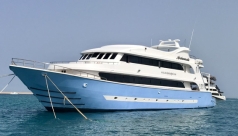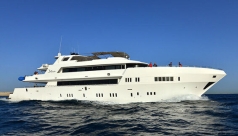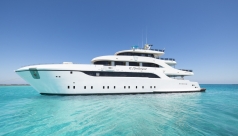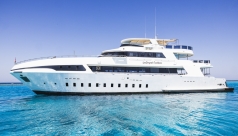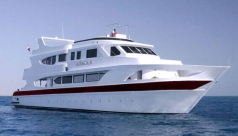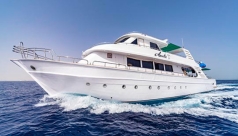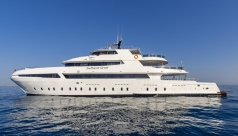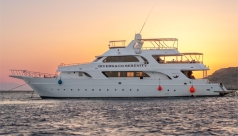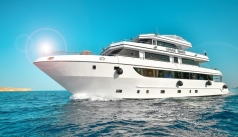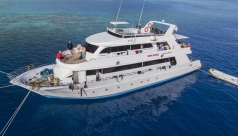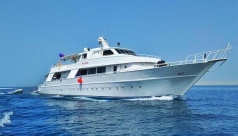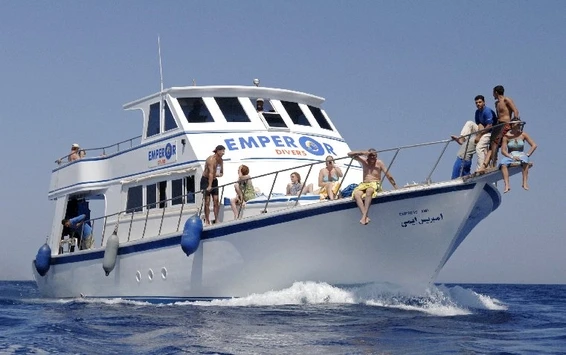Hurghada offers a great mix of Red Sea scuba diving, desert adventures, and vibrant nightlife - all at very affordable prices compared to other Mediterranean destinations.
The town is a fusion of 3 centres - New Hurghada, El Dahar and Sigala. As they expand, these 3 centres are growing into one conurbation and it must be said that Hurghada is a town seemingly under constant development. Downtown Hurghada, or Dahar, is the oldest district of the city. As in all of Egypt, the proprietors of the busy bazaars and shops will relentlessly hassle you for business. Sigala towards the south is right in the middle of the tourist section. Here you will find a treasure trove of hotels, bars, cafés, beach discos, hotel discos and shops. As you go even further south, you will encounter New Hurghada, which sports a walkway with cafés, a shopping mall, shops and even a bowling alley. As a whole, the area is regarded as a bit of a party town and discos and bars are easy to come by.
Sightseeing & Activities
* What are the must-do activities in Hurghada?
-
Hurghada offers incredible diving and snorkelling at nearby islands like Giftun Island with its healthy coral reefs.
- No trip to Egypt would be complete without at least one desert safari. Options vary greatly in format, duration, vehicles and prices, but most trips will take you off the beaten track and as far into the desert as 40 to 80 km. Trips vary in length from 3 hours to a whole day, but it's a great thrill to explore the sand dunes on either quad bikes or in a Jeep.
- For culture, visit the St. Anthony and St. Paul monasteries or enjoy the Fantasia 1001 show featuring belly-dancing and Arabian horses.
* What water activities are available?
Beyond diving, you can enjoy windsurfing, deep-sea fishing, and submarine tours (perfect for non-divers). The submarine reaches 22m depth, offering 50 minutes of underwater exploration.
Dining & Nightlife
* What's the food scene like in Hurghada?
Hurghada offers everything from authentic Egyptian cuisine (meaty dishes with subtle spices) to international fare. Marina Boulevard features 15 upmarket restaurants serving Thai, sushi, fish & chips, and more.
* How is the nightlife?
Hurghada's nightlife is legendary, ranging from international spots like Hard Rock Café to local favourites like Papa's Beach Club and Black Out Disco. Theme nights are common at various venues around town.
Shopping
* Where are the best places to shop?
For authentic Egyptian shopping:
- Sigala's bazaars offer the best prices (10-50% cheaper than downtown)
- Downtown bazaar has the widest selection of souvenirs
- Marc's Bazaar sells shoes, perfume, clothes,souvenirs and other popular tourist items
- Marina Boulevard offers fixed-price shopping
- Don't miss Alama and Papyrus shops for unique gifts
Beaches & Islands
* Which beaches are best?
Most beaches are hotel-owned but accessible for a fee:
- Old Vic Tourist Village: Great for families
- Magawish Resort Village: Longest beach, conveniently located
- Shedwan Golden Beach: Affordable 2 km stretch with pool access
* What islands should I visit?
Giftun Island is the top choice for its beautiful reefs and beaches. Other great island options include Shaab El Erg, Shaab Abu Shiban, Umm Gammar, Sharm el Arab, Shaab Abu Hashish, and Abu Mingar for snorkelling and diving.
Transportation
* What's the best way to get around?
• Minibuses are the cheapest and most frequent option
• Taxis are available but always negotiate the fare before getting in
• Many hotels offer shuttle services to popular areas
Pro Tips
• Bargain hard at bazaars (start at 50% of asking price)
• Carry small bills for taxis and beach fees
• Book desert safaris and historical tours in advance
• Try karkade (hibiscus tea) and falafel from street vendors
• Respect local customs (dress modestly outside resort areas)
For more ideas visit:
Leisure Travel Egypt.



